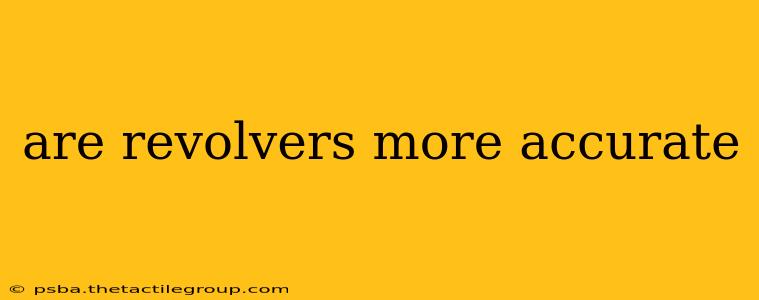Are Revolvers More Accurate Than Semi-Automatic Pistols? A Deep Dive into Accuracy and Precision
The question of whether revolvers or semi-automatic pistols are "more accurate" is a complex one, lacking a simple yes or no answer. Accuracy, in the context of firearms, is a multifaceted concept encompassing both precision and accuracy. Let's break down the key factors influencing the accuracy of both types of handguns:
Understanding Accuracy and Precision in Firearms
Before comparing revolvers and semi-automatic pistols, it's crucial to define our terms:
-
Accuracy: This refers to how close a group of shots are to the point of aim. A highly accurate firearm will consistently place shots near the bullseye.
-
Precision: This describes the consistency of shot grouping. A precise firearm will produce tight shot groups, regardless of where those groups are located relative to the target. A weapon can be precise but not accurate (consistent misses), or accurate but not precise (widely scattered shots).
Factors Affecting Revolver Accuracy
Revolvers, known for their simplicity, generally offer certain advantages regarding accuracy:
-
Simple Mechanism: Fewer moving parts mean less potential for malfunctions that can affect shot placement.
-
Consistent Trigger Pull (Often): Many revolvers, especially higher-end models, boast a smoother, more consistent trigger pull than some semi-automatic pistols, leading to improved precision. This is, however, highly variable based on the specific model and quality of the revolver.
-
Heavier Weight (Generally): The heavier weight of many revolvers can contribute to greater stability during firing, reducing recoil and improving accuracy.
-
Cylinder Alignment: While cylinder alignment is crucial, modern manufacturing processes minimize this as a factor affecting overall accuracy in most cases.
Factors Affecting Semi-Automatic Pistol Accuracy
Semi-automatic pistols, despite their more complex mechanisms, can also achieve high levels of accuracy:
-
Higher Capacity: The higher magazine capacity allows for more rapid follow-up shots, providing opportunities to refine aim and achieve better accuracy over multiple shots.
-
Ergonomics: Many semi-automatic pistols are designed with advanced ergonomics, offering a better grip and improved control, positively impacting shot placement.
-
Advanced Sight Systems: Semi-automatic pistols frequently incorporate advanced sighting systems, such as fiber optic sights or night sights, which enhance target acquisition and precision.
-
Barrel Length: Generally, longer barrels improve accuracy by allowing the bullet to fully utilize the propellant's energy. This is a factor that applies to both revolvers and semi-automatic pistols.
The Verdict: It's Not About the Type, But the Specific Weapon
Ultimately, the accuracy of a handgun depends far more on the individual firearm's quality, the shooter's skill, and the ammunition used than on whether it's a revolver or a semi-automatic pistol. A poorly manufactured revolver will be less accurate than a well-made semi-automatic pistol, and vice-versa. A skilled shooter can achieve high accuracy with either type of firearm.
Key Considerations:
- Ammunition: The consistency and quality of the ammunition significantly impact accuracy.
- Maintenance: Regular cleaning and maintenance are crucial for both revolvers and semi-automatic pistols to maintain optimal accuracy.
- Shooter Skill: Proper shooting technique, including grip, stance, and trigger control, is the most important factor in achieving accuracy.
In conclusion, there's no definitive answer to the question of which type of handgun is inherently more accurate. The accuracy and precision of any firearm are determined by a combination of factors, and both revolvers and semi-automatic pistols can achieve exceptional accuracy in the right hands with proper maintenance and high-quality ammunition.

